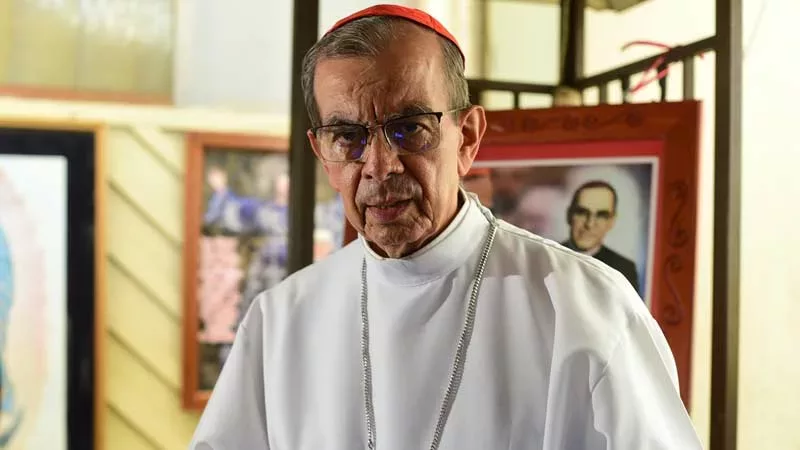El Salvador is immersed in an atmosphere of confrontation and needs to understand that “without dialogue, there is no peace.” This was stated by Cardinal Gregorio Rosa Chávez, who warns that the country is not following the right path to achieve unity, peace, and reconciliation.
The prelate expressed this after a journalist asked him for an evaluation of the events that occurred in 2022 in El Salvador.
“Notice that Pope Francis exposed in a letter how true democracy is; we (the Salvadoran church) also published a pastoral letter before the last elections, but nobody paid attention to what our message said; it says there that without dialogue, there is no peace, without the need for respect, there is no peace, then that message is much needed in the country because we are confronted, we are polarized, and that path does not lead to peace,” stressed the religious leader at a press conference.
His statements were made in the framework of the presentation of the book “Conversations with the Cardinal,” written by the priest Ariel Beramandi, in which the life experience of the first Salvadoran cardinal in the history of the Church is presented chronologically, including his participation in the peace process before 1992.
The hierarch of the Church showed the document and said: “So here is evidence of how peace is made; this book speaks of the peace process, speaks of martyrdom, (dialogue) is the right path, but here (in the country) we are not following it at the moment.” The religious were also consulted on the pension reform, to which he answered that this is a “very complex” subject and needs a free and profound debate.”
In addition, Rosa Chávez explained how the Salvadoran Church began to issue opinions on current issues. He considered that “there are issues where an opinion can be given and not a dogma.” In this regard, he stressed that “there are things that must be defended even with life, such as the issue of human rights or the dignity of people; for example, with the issue of prison (regime of exception), one cannot say that it is okay that mothers do not know where their children are, the Church cannot accept it. This issue is not negotiable”.
The comment of the religious applies to the reality that is lived in the country; since, like him, human rights experts, journalists, and even politicians have pointed out the constant confrontation that exists and assures that the hate speech begins from the government of Nayib Bukele and his officials to then transfer it to the citizens.
In this sense, the cardinal reiterated: “I want to emphasize that without dialogue, there is no peace; without mutual respect, there is no peace; without tolerance, there is no peace, and that is what we have to be clear about in the country and try to make that what guides us all.”
“En El Salvador estamos confrontados y sin diálogo no hay paz”, dice Rosa Chávez
El Salvador se encuentra sumergido en un ambiente de confrontación y necesita comprender que “sin diálogo no hay paz”. Así lo afirmó el cardenal Gregorio Rosa Chávez, quien advierte que el país no se está siguiendo el camino adecuado para lograr la unidad, la paz y reconciliación.
Esto lo expresó el prelado luego de que un periodista le solicitara una evaluación sobre los acontecimientos ocurridos durante este 2022 en El Salvador.
“Fijate que el Papa Francisco expuso en una carta cómo es la verdadera democracia, también nosotros (iglesia salvadoreña) publicamos una carta pastoral antes de las elecciones últimas, pero nadie le hizo caso a lo que decía nuestro mensaje, ahí dice que sin diálogo no hay paz, sin la necesidad de que se respete, no hay paz, entonces ese mensaje se necesita mucho en el país, porque estamos confrontados, estamos polarizados y ese camino no lleva a la paz”, recalcó el líder religioso en rueda de prensa.
Sus declaraciones se dan en el marco de la presentación del libro “Conversaciones con el Cardenal”, escrito por el sacerdote Ariel Beramandi, en el que se presenta cronológicamente la experiencia de vida del primer cardenal salvadoreño en la historia de la Iglesia, incluyendo su participación en el proceso de paz previo a 1992.
El jerarca de la Iglesia mostró el escrito y dijo: “De modo que aquí hay pruebas de cómo se hace la paz, este libro habla del proceso de paz, habla del martirio. (El diálogo) es el camino correcto, pero aquí (en el país) no lo estamos siguiendo por el momento”. El religioso también fue consultado sobre la reforma de pensiones, a lo que contestó que este es un tema “complejísimo” y que necesita un debate libre y profundo”.
Además, Rosa Chávez expuso cómo la Iglesia salvadoreña comenzó a emitir opiniones en temas coyunturales, y en ese sentido consideró que “hay temas que se puede dar una opinión y no un dogma”. En relación a esto, destacó que “hay cosas que hay que defenderlas hasta con la vida, como son el tema de los derechos humanos o la dignidad de la personas; por ejemplo, con el tema de la cárcel (régimen de excepción), uno no puede decir que está bien que las madres no sepan dónde están sus hijos, no puede aceptarlo la Iglesia. Ese tema no es negociable”.
El comentario del religioso es aplicable a la realidad que se vive en el país; ya que, al igual que él, expertos en derechos humanos, periodistas y hasta políticos han señalado la constante confrontación que hay y aseguran que el discurso de odio comienza desde el gobierno de Nayib Bukele y sus funcionarios para trasladarlo luego a la ciudadanía.
En ese sentido, el cardenal reiteró: “Quiero rescatar que sin diálogo no hay paz, sin respeto mutuo no hay paz, sin tolerancia no hay paz y eso es lo que tenemos que tener claro en el país y tratar de que eso sea lo que nos guíe a todos”.

